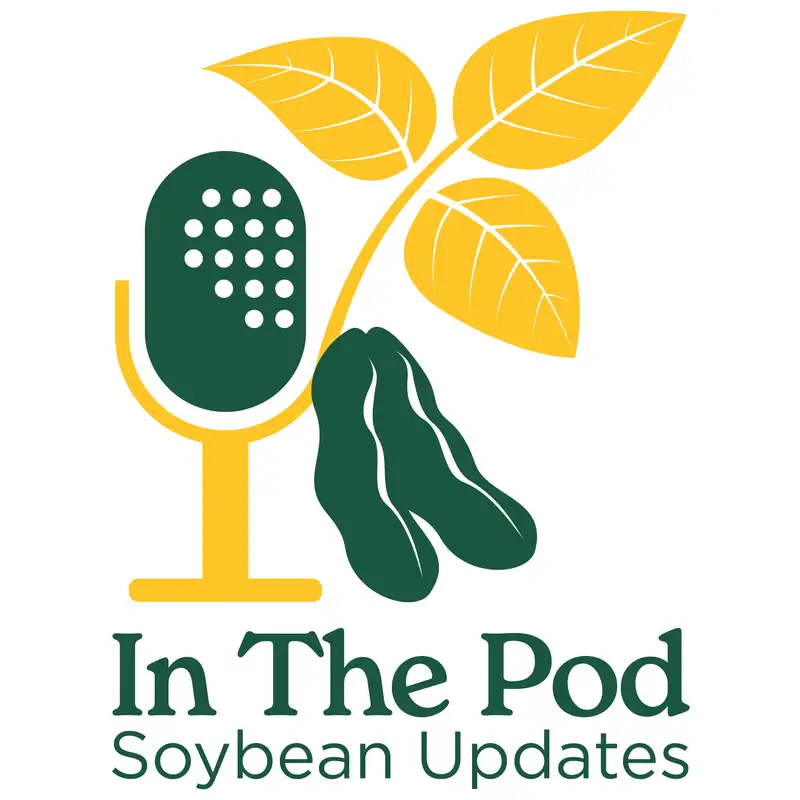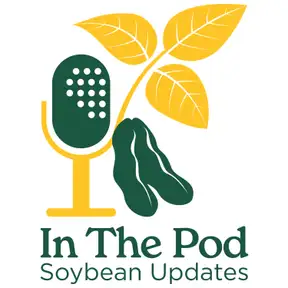06/26/25 The Weed Battle Changes with Soybean Stages
You're listening to In The Pod, soybean updates, a weekly trek into the latest soybean information from NDSU Extension. Weed control in soybeans continues to be challenging according to Joe Ikley, NDSU Extension weed control specialist. Soybean weed management changes with the soybean stages. Joe, what's the latest on the weed situation?
Joe Ikley:Yeah. So most areas of the state have gotten plenty of precipitation moisture at this point in the year, so the weeds are there. They've been there for a while and have been growing, but overall, we've been in a relatively cooler weather pattern. So weeds are there and growing, but haven't been growing as fast as we might expect most typical June's. So now that we have had some heat and now we're on the longest days of the year, these weeds are set to start growing rapidly. And so for fields that have not had herbicide applications or need additional herbicide applications, we're in a really critical time of the year for making those.
Bruce Sundeen:We're approaching the next stage in soybeans, r one. How does weed management change?
Joe Ikley:Yep. So once we get to the solstice, that's when we start thinking now we'll have shorter nights. Soybeans are gonna start thinking about flowering. And so once we start getting flowers in soybean, that becomes a cutoff stage for some of our important herbicides. Top one on my mind is glufosinate. So Liberty two eighty or Liberty Ultra now will be the main brand with plenty of generic options out there. But the label say up to r one is when we can apply. So once those soybeans start flowering, then technically, we're done applying that product. So it's gonna be pretty important to monitor our fields, make sure we get these applications made in a timely manner because certainly for kochia and also for waterhemp, other weeds like common ragweed, one of our best products that we have in soybean. We're relying a lot on that product this year. And so just recognizing that growth stage cutoff will be rapidly approaching certainly in the earlier planted fields.
Bruce Sundeen:How are things going with our old pal waterhemp?
Joe Ikley:Yes. So it's been a tremendous year for waterhemp if you're waterhemp. It's not really been a fun one if you're trying to fight it. So we've seen a lot of germination early in the year, so we will certainly have been battling that one. So, hopefully, we had some residual products on many cases. We've had an early postemergence application by now as well. But considering that we still have a long way to go till canopy closure on these fields, basically, additional rainfall events, expect some waterhemp will germinate until we get canopy closure. So we always talk about these applications before flowering, considering throwing in additional residual herbicide, usually a group 15 is what we're discussing when it comes to trying to catch additional waterhemp. We don't always need that type of a program if you don't have a waterhemp issue, but for those battling waterhemp, we do anticipate until the canopy closes, any additional rainfall will stimulate additional germination, and we're just trying to keep those late season waterhemp from coming up and being an issue.
Bruce Sundeen:Joe, what about the test kits you've been talking about?
Joe Ikley:Yes. We've been advertising these test kits now. This is actually the second year of this program, but each county office will have a kit, and a kit is basically an envelope with four small coin envelopes in it. And what we're encouraging folks, if you have kochia or waterhemp, we're trying to test for resistance to group two, group nine herbicide, that's glyphosate, and our group 14 herbicides. So we might use a lot of that to non GMO soybean, things like fomesafen, which is Flexstar will get used quite a lot to try and control waterhemp. This year, what is new is we are offering to collect green foxtail or wild oat samples. So there'll be one little envelope in there that's pre labeled green foxtail or wild oat. Those results won't come back this year, not until the spring. That's trying to develop additional testing to be rapid tests next year. COCA and waterhemp, if you submit the samples within seven days of the National Ag Genotyping Center receiving that sample, you will get results back to the email or the the contact that you put on that sheet.
Bruce Sundeen:How do we get one of these kits, Joe?
Joe Ikley:Each county office will have these kits. Most of the REC centers will also have a kit. If your county office or local REC has run out, feel free to reach out and contact myself or the National Ag Genotyping Center. These kits are sponsored by the North Dakota Soybean Council and the Corn Utilization Council this year.
Bruce Sundeen:Thanks, Joe. Our guest has been Joe Ikley, NDSU Extension weed control specialist. You're listening to In the Pod, soybean updates, a weekly trek into the latest soybean information from NDSU Extension, supported by the North Dakota Soybean Council.

